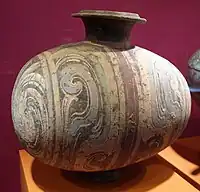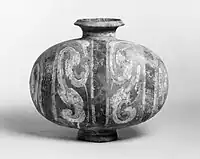Cocoon jars or Cocoon-shaped jars are funerary pottery vessels in China, belonging to the period of the 1st millennium BCE.[1] The shape is similar to the Cypriot Barrel-shaped jugs, as is generally the decoration, with vertical bands across the breadth of the vessels. The earliest type of cocoon-form jar in China dates to the Western Zhou period (99-771 BCE), either in ceramic or in bronze. The Qin dynasty period has many of them, particularly in relation with the Mausoleum of the First Emperor.[1] It has been suggested that the Chinese obtained this design from nomadic people, especially the Rong and Di cultures, through the medium of the steppes of Central Asia.[2]
 Western Han dynasty cocoon vessel (206 BCE-8 CE).
Western Han dynasty cocoon vessel (206 BCE-8 CE). Cocoon vessel, Han dynasty
Cocoon vessel, Han dynasty Cocoon-shaped vessel, Han dynasty (206 BCE–220 CE)
Cocoon-shaped vessel, Han dynasty (206 BCE–220 CE) Eastern Han coccon jar, 1st century CE
Eastern Han coccon jar, 1st century CE Cocoon-Shaped Jar, Han dynasty, Metropolitan Museum of Art.[3]
Cocoon-Shaped Jar, Han dynasty, Metropolitan Museum of Art.[3]
References
- 1 2 Qingbo, Duan (2022). "Sino-Western Cultural Exchange as Seen through the Archaeology of the First Emperor's Necropolis". Journal of Chinese History 中國歷史學刊. 7: 56–58. doi:10.1017/jch.2022.25. ISSN 2059-1632. S2CID 251690411.
- ↑ Chong, Alan (1 January 2011). Terracotta Warriors: The First Emperor and His Legacy. Asian Civilisations Museum. p. 70.
- ↑ "Cocoon-Shaped Jar China Han dynasty (206 BCE–220 CE)". The Metropolitan Museum of Art.
![]() Media related to Cocoon jar at Wikimedia Commons
Media related to Cocoon jar at Wikimedia Commons
This article is issued from Wikipedia. The text is licensed under Creative Commons - Attribution - Sharealike. Additional terms may apply for the media files.